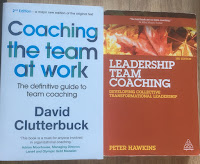My colleagues and I in the Coaching Supervision Partnership had an excellent CPD workshop on Trauma, run by Alan Brice, a counsellor and supervisor with considerable experience, expertise and wisdom in this field.
It was a rich afternoon's learning, and one of the aspects I continue to reflect on is the notion of mental mobilisation. There seems to be growing evidence that the degree to which we are prepared for an experience that may be traumatic has a significant impact on how well we are able to deal with it.
Alan cited the example of ambulance crews, who are called to a category three (top priority) emergency. They know that they are likely to encounter a critical situation, that involves the possibility of dealing with death. Whilst that is difficult, of course, they are ready for that, and that helps them to cope. However, when called to a lower category of incident, and then unexpectedly having to deal with a fatality, it is very much harder to cope.We also talked about some people who have higher base levels of anxiety than others, who are also sometimes particularly good at dealing with crises: we wondered if a degree of mental mobilisation may be in play here, too.
All of which raised the interesting question, is it possible to be mentally mobilised in the face of unknown threats and challenges, which may arise at unpredictable times? And further is that possible without stimulating a continuing sense of hyper-arousal that would be debilitating?
The answer is that we don't really know. I remember reading in HBR or somewhere similar, an article that claimed that executive teams that have done a lot of disaster simulation exercises were better at dealing with actual crises, even of a different nature; but I can't find the article and don't remember how robust the evidence was. It has a surface plausibility, but that's all I can vouch for.But the question continues to fascinate me, and if I come across more research on the topic, I will return to it. In the meantime, I think that the most useful preparation one can make for unforeseen challenges and changes (and we know they will come, we just don't know what or when) is the research-based approaches to personal resilience; investing time and care in putting in place the habits that will keep us fit for such challenges.
--
With thanks to Joe Kibria and Markus Winkler for sharing their photography on Unsplash












 This is more comprehensive than many, having six core competences, each underpinned by seven specific behaviours. And that is the other thing I really like: the assessments are behavioural. They ask those giving feedback on an individual about specific observable behaviours. Not only that, but they ask both how important each behaviour is, and also how frequently they see it demonstrated. That gives participants very specific feedback. On the one hand, they learn what they are doing that works, that people find valuable; and on the other, what they could do more of, in order to increase the quality of their interactions with others. And that is all backed up with benchmarking data, and of course with written comments by those completing the feedback.
This is more comprehensive than many, having six core competences, each underpinned by seven specific behaviours. And that is the other thing I really like: the assessments are behavioural. They ask those giving feedback on an individual about specific observable behaviours. Not only that, but they ask both how important each behaviour is, and also how frequently they see it demonstrated. That gives participants very specific feedback. On the one hand, they learn what they are doing that works, that people find valuable; and on the other, what they could do more of, in order to increase the quality of their interactions with others. And that is all backed up with benchmarking data, and of course with written comments by those completing the feedback.

 Other tools I have found helpful include
Other tools I have found helpful include 






























